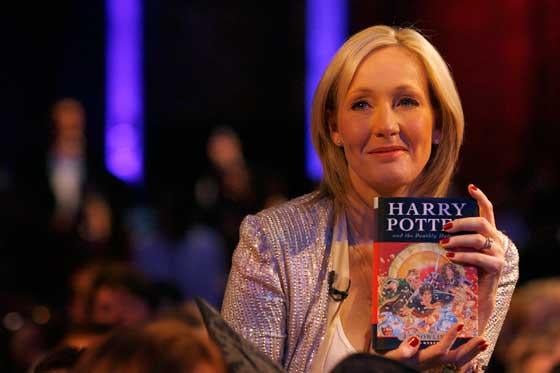
Harry Potter author JK Rowling today failed in a legal bid to ban publication of a photograph of one of her children which was taken in the street.
The picture, showing Rowling and her husband with son David in a buggy, was taken by a photographer using a long-range lens and appeared in the Sunday Express magazine to illustrate an article about her approach to motherhood and family life.
The author – suing under her real name, Mrs Joanne Murray – and her husband, Dr Neil Murray, brought a High Court action in their son’s name against Express Newspapers and the agency which supplied the photograph, Big Pictures (UK).
They complained that their son’s right to privacy had been infringed and sought damages and an injunction banning further publication of the photograph or any other picture taken of him without his consent.
Express Newspapers settled the claim, and today a judge in London “struck out” the remaining proceedings against the picture agency.
Mr Justice Patten said: “I have considerable sympathy for the claimant’s parents and anyone else who wishes to shield their children from intrusive media attention.
“But the law does not in my judgment (as it stands) allow them to carve out a press-free zone for their children in respect of absolutely everything they choose to do.”
The judge granted the Murrays permission to appeal and continued a temporary ban on publication of the picture in the meantime.
David, now four, was only 20 months old when the picture was taken, covertly, in an Edinburgh street in November 2004.
His parents, as his “litigation friends”, alleged breach of confidence and privacy, and misuse of private information. The claim was brought under human rights law and the Data Protection Act.
The judge said: “I think it is fair to say that it is seen by the claimant’s parents as something of a test case designed to establish the right of persons in the public eye to protection from intrusion into parts of their private or family life even when they consist of activities conducted in a public place.”
David had suffered no individual distress from the taking of the picture and was only photographed because of the identity of his mother.
“The reality of the case is that the parents seek through their son to establish a right to personal privacy for themselves and their children when engaged in ordinary family activities wherever conducted,” he said.
Rowling, who also has a daughter, Mackenzie, aged two and a half, and a 14-year-old daughter, Jessica, by a previous marriage, became upset when photographed with her children in the street. She said her children also became upset, either on their own account or because she had become upset.
The agency’s defence was that the English courts had refused to recognise the right of an individual not to be photographed in a public place, except when special factors such as harassment, distress to a child or disclosure of confidential information was involved.
Mr Justice Patten pointed out that, before the 1998 Human Rights Act, the law did not recognise any such right at all, and there was still no general cause of action for “invasion of privacy”.
“If the law is such as to give every adult or child a legitimate expectation of not being photographed without consent on any occasion on which they are not, so to speak, on public business, then it will have created a right for most people to the protection of their image,” he said.
“If a simple walk down the street qualifies for protection, then it is difficult to see what would not.”
For most people who were not public figures, there would be virtually no aspect of their lives which could not be said to be private.
The judge said the boundaries of what people could expect to remain confidential or private were inevitably influenced “by the fact that we live in an open society with a free press”.
There was “an area of routine activity which, when conducted in a public place, carries no guarantee of privacy”.
He was not persuaded in today’s case that the mother’s understandable sensitivity to and upset caused by her children being photographed could of itself be allowed to dictate the legal boundaries.
The facts of the case were insufficient to establish a claim for breach of David’s right to respect for his private and family life.
The claim had “no realistic prospect of success”.
The judge also rejected argument under the Data Protection Act that the photograph amounted to unlawful and unfair use of personal data relating to David.
The photo agency was awarded £40,000 interim costs against the Murrays pending the outcome of the appeal and a final costs assessment.
The parents were not in court.
Email pged@pressgazette.co.uk to point out mistakes, provide story tips or send in a letter for publication on our "Letters Page" blog
